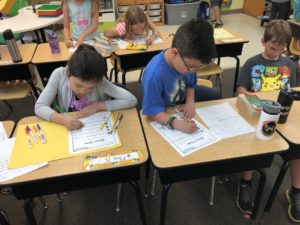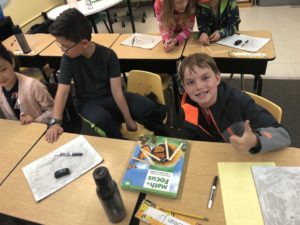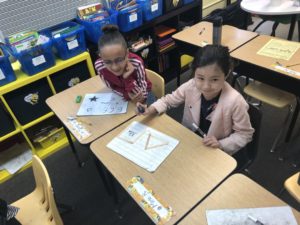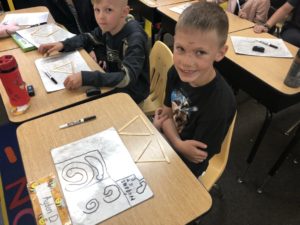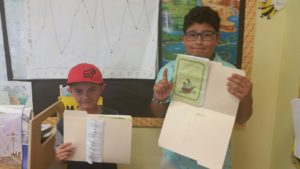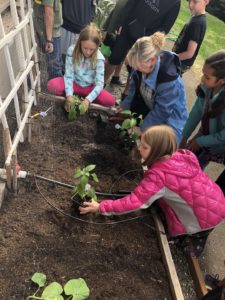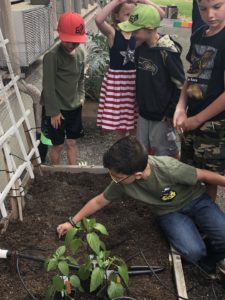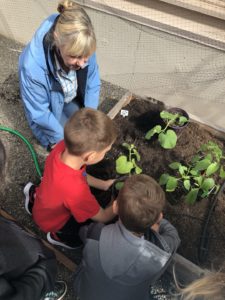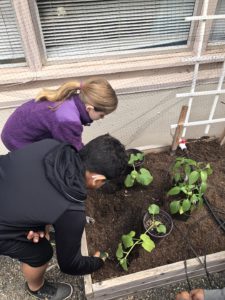Literatura
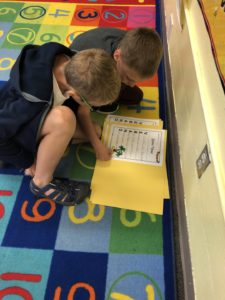 This week we completed our Unit Assessment. Our objectives were:
This week we completed our Unit Assessment. Our objectives were:
- students will demonstrate their understanding of grammar, vocabulary, and writing that was studied during this unit
- review what an acrostic poem is then write an acrostic poem about summer
Matemáticas
This week we began our new chapter Two-Dimensional Shapes. Our objectives were:
- identify open and closed figures
- identify special polygons and quadrilaterals
- classify quadrilaterals by parallel sides, length of sides, and angles
- combine and separate polygons to make other polygons
History & Geography
Social studies with Ms. Marci
This week we began our last unit on Colonial America. On Thursday we began to work on our lap books for this unit, the class made their time lines and Jamestown booklet. The class was reminded that our Explorer projects are due Tuesday, June 5.
Our objectives were to:
• Describe the impact Spanish, French, Portuguese, and Dutch exploration and Conquest in the Americas had on the english and their decision to settle parts of North America
• list and locate the three colonial regions: New England, Middle Atlantic, and Southern
• locate Roanoke Island in the southern region, and identify it as a failed English colonization attempt
• explain why Roanoke is known as the Lost Colony
• describe some of the reasons people came to North America from England and other countries
• explain some of the early challenges faced by the English in establishing colonies in North America
• describe how everyday life and economic Industries in the three colonial regions were shaped by geography and climate
• describe the relationship between the colonists and Native Americans
• describe the industries and other characteristics of the three colonial regions
• identify the Discovery, Susan Constant, and Godspeed as a three ships that brought English settlers to Jamestown
• identify King James, the Virginia Company of London, Pocahontas and the Powhatan, and Captain John Smith as key elements to the Jamestown Colony
• explain the term starving times as it relates to the Jamestown Colony
• describe the role of slavery in the colonial time period and why the southern colonies relied so much more heavily upon enslaved labor than the Middle and New England colonies
• compare and contrast indentured servants and enslaved laborers
• identify 1619 as the year the first known African laborers were brought to the colonies and that the first Africans in the English colonies came to Jamestown as indentured servants, not enslaved laborers
Social Studies with Ms. Laura We ended our unit on Immigration and Citizenship with a review and assessment, and our reports, presentations and celebration. The sharing of information, and food, was amazing! We started our final unit, Civil Rights Leaders, by learning about Susan B. Anthony, Mary McLeod Bethune, and Eleanor Roosevelt. We learned how these women worked hard to promote equality. They lived in different times and had different passions, but all were successful in helping people.
Science
On Tuesday the class had the opportunity to do some planting in our school’s garden beds with Barbara and Russ. It was a great learning experience about the proper way to plant starts. This week in our ecology domain we learned more about natural changes and human changes to the environment. Students worked on their ecosystem project on Friday. These projects will mainly be done in class, they are due on Tuesday, June 19.
Our objectives were to:
• explain why nature and ecosystems are not static but are constantly changing
• explain why sometimes animals must leave their habitats when the natural balance is lost
• explain how ecosystems are affected by changes in the environment
• explain how humans affect ecosystems and the environment
• describe and identify human made threats to the environment
• explain why sometimes animals must leave their habitats when the natural balance is lost
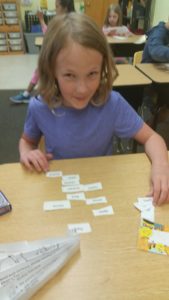 English Word Work
English Word Work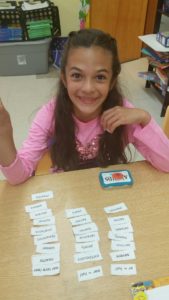
The class took our spelling test this Friday. Instead of grammar each person made a list of all the idioms they could think of. We will be doing more with these in the weeks to come. In our journals we used the word of the week “taunt”.
Specialists
Music with Ms. Erin
- In May we learned about and strengthened knowledge of music theory symbols, including: clefs, written notation, dynamic signs, the staff, bar lines, and the double bar.We learned all about the American composer Aaron Copland, and listened to his most popular works. We learned and sang the song In the Good Old Summertime.
We also started work on a new song that we will be performing for you!In June we will focus on: - Music theory symbols such as quarter rests, and eighth notes (single and grouped)
- Singing pitch and rhythm
- Instrumental and collaborative performance skills
- Learning about Russian composer Nikolai Rimsky-Korsakov, and listening to his piece Scheherazade, Part One: “The Sea and Sinbad’s Ship”
Art with Ms. Kelly
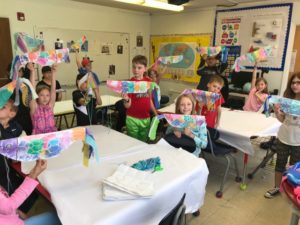 We displayed and admired all of our finished Mother’s Day “Tree Weavings,” and we read “Geraldine the Goat,” a fun story based on an actual Navaho rug weaver.
We displayed and admired all of our finished Mother’s Day “Tree Weavings,” and we read “Geraldine the Goat,” a fun story based on an actual Navaho rug weaver.
We made Koinobori or Carp Windsocks. The goals were:
- Learn about Children’s Day in Japan – May 5
- Draw and cut out a fish shape on paper
- Learn how to draw fish scales using oil pastels
- Add color and texture by using tissue paper and water
- Listen to Haiku poetry
- Thank you to Miria for helping us with the pronunciation and meaning of Koinobori!
Bald Eagle project (to celebrate Memorial Day, Flag Day, Independence day). Goals were to:
- Learn about our National Emblem and National holidays
- Observe photos of eagles: feathers, beak, talons, etc.
- Learn how to make and use a grid for drawing an eagle
- Learn how to use torn paper to create a collage of color and texture for the eagle
These beautiful collages are on the bulletin board at school!
We started a Pop Art project using summer flip flops as a theme. The goals are:
- Learn about Pop Art and look at some of Andy Warhol’s art
- Paint a background for our flip flop designs
- Design your own flip flops on paper
To be continued in June

